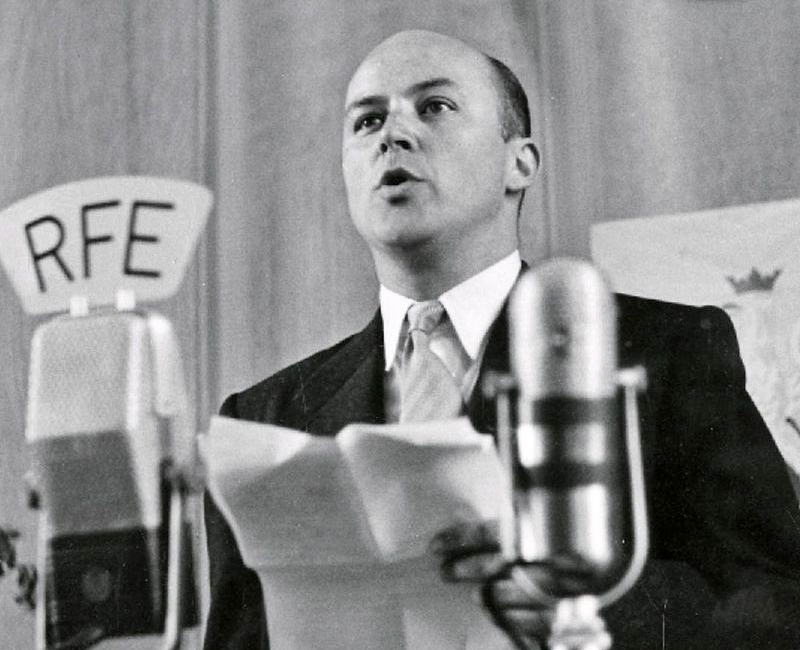Case Study: Poland
The leaders of the Soviet sphere of influence believed that Radio Free Europe’s influence in the Eastern bloc was “ideological sabotage” which set back Soviet efforts to bring about communism via a socialist republic. This was because the leaders of the Soviet sphere believed that information restriction was vital to achieving the end goal of communism, and RFE broke that restriction. Thus, Soviet leaders used many strategies in order to control people’s consumption of RFE, which sometimes met resistance. One nation which tried to do this was Poland.

The 1950s
Many Poles considered RFE to be the main source of sovereign information about the events in their country and the rest of the world. It also encouraged them to develop their own ideas about their own reality, as opposed to the official propaganda. This was especially important during the fifties, due to extremely tight controls over information at the time.
In the fifties, the Polish government took a Stalinist approach towards suppression of RFE. The government would jam radios. Radio jamming is a method of disrupting radio communication by decreasing the signal to noise ratio. This means that a jammed radio station would sound very faint and difficult to hear over the buzzing noises caused by jamming. Propaganda was used to dissuade people from listening to RFE. The goverment would also arrest groups of people who were found listening to the radio together and send them to labor camps.
The Words of the People
"I listened to them (Radio Free Europe) every day...Had it not been for RFE, I would have felt completely alone. I could only have sat in my armchair and talked to myself about how I didn't like things. But now I could find a confirmation for my views in RFE’s programs. They talked about everything that irritated me in this country."
~ Andrezej Kostrzewsk
"...stated whether I listened to the radio, to which I responded that I did not, to which he stated to me that I should listen to Free Europe in the evenings, so that I would learn, because we no longer have a Poland…"
~ a court witness recalling what her village leader (Danczow village, in the district of Klodzko) told her about RFE
Reform
The Stalinist approach was coming to an end by the mid 1950s. In 1956, inspired by the Hungarian Revolution, the people revolted. They demanded that the government end jamming, and even went as far to destroy jamming equipment in government buildings in Poznan and Bydgoszcz.

However, after the 1956 revolt, the Polish government realized that such a hardline stance against the listeners of the radio was ineffective at stopping listeners. Thus, they began a variety of approaches, many of which were headed by Wladyslaw Gomulka. This led to a semi thaw of opposition to RFE. For example, people were no longer arrested for listening to RFE/RL. Instead, Polish leaders would try to negotiate with RFE/RL to stop broadcasting during Detente periods. During this era, the Polish government attempted to figure out how information was getting out to the West in only about a day. If they could stop the flow of information, they stop Radio Free Europe. They discovered that information would be delivered to the American Embassy, where it would be sent out to the RFE headquarters in Munich. News would also travel by word of mouth.
In June 1976, raised food prices and other basic commodities led to protests in the streets. This led to the creation of many underground networks to monitor and oppose the government’s behavior. One such way to do so was to listen to Radio Free Europe, which regularly criticized the Polish government. It also served as a gateway to political engagement or opposition activities. When one member of an underground opposition network was asked about RFE/RL's influence on her understanding of the political situation at the time of 1976, they said:
"It was then (the 1976 protests) that we began to listen to Free Europe every day...And what vast quantities of information there were about the opposition: we learned that there were people who were not afraid of putting their names on protest letters. We were not alone."
~ Krzysztof Nowak of the Young Poland Movement
Why RFE/RL?
RFE was easily the most heavily jammed Western radio station in the Eastern Bloc compared to other Western stations. Why is this?
One reason was that RFE’s programs were more political and viewed the Soviet sphere in a less positive viewpoint compared to other programs. Voice of America, for example, had more emphasis on American entertainment than on the news. Other stations like Deutsche Welle focused more on the internal politics within the station’s country of origin, rather than international politics or politics pertaining to the Soviet sphere. Still, stations like the BBC who focused on both international politics and politics pertaining to the Eastern Bloc were less incendiary than RFE. For example, during Soviet elections, RFE would encourage its listeners to go to the polls and cross out names on the ballots.
Another reason was that RFE’s information was not entirely propaganda. It was credible information. Polish Foreign Minister Adam Rapacki was to have started every workday by reading a half kilogram of paper’s worth of transcripts from RFE programs.
This only made Radio Free Europe even more dangerous to the political establishments in the Eastern bloc.